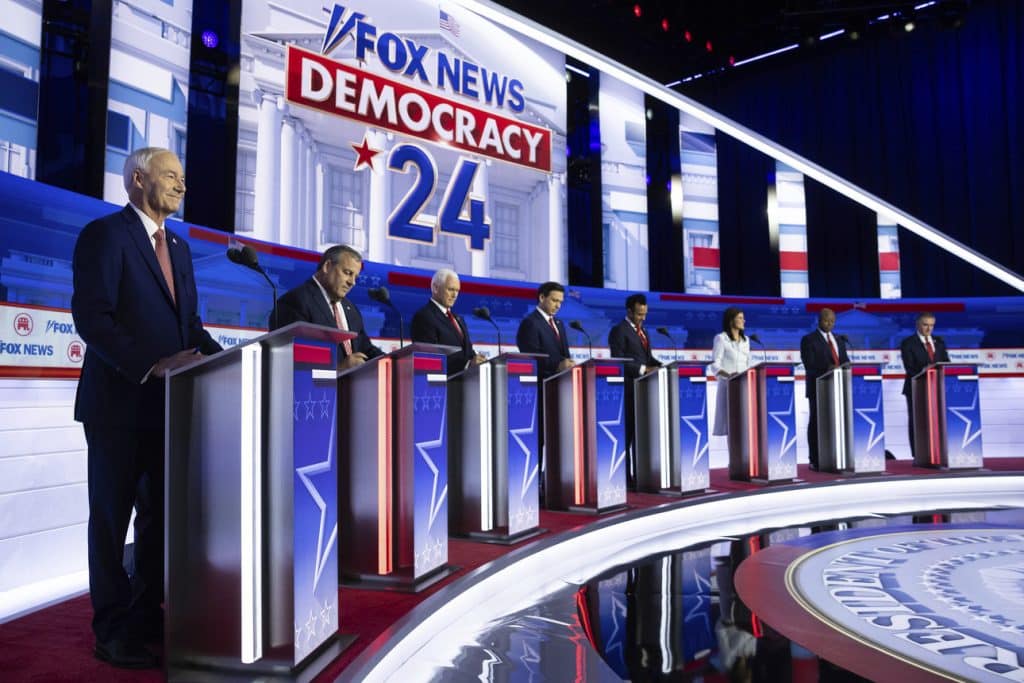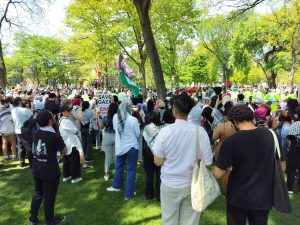On August 24, eight Republican presidential hopefuls — with the notable exception of Donald Trump — took the stage in Milwaukee for the first GOP primary debate ahead of the 2024 general election. A media circus as much geared towards driving ratings as introducing candidates, the debate nonetheless revealed aspects of the organic crisis within the U.S. and disagreement among the capitalists about how to respond to it. For the Republicans, that disagreement and lack of cohesion is also reflected in confusion about how to defeat Trump at the ballot box. The Republican Party came across very confused, disjointed, and at odds with itself. Rhetoric wheeled wildly as each candidate struggled to find their footing. Frequently, there were as many diametrically opposing policies as candidates on the stage. The dueling pressures of mainstream politics and Trump’s base were on full display as candidates attempted to be simultaneously bonapartist and anti-government.
U.S. political and economic hegemony is currently less secure than it has been since the end of the Cold War. An ascendant China and the strengthened BRICS coalition are challenging U.S. control over production and strategic resources, such as oil and lithium. The rate of profit has been steadily declining since the 1970s. Deepening social crises expressed in the successive Black Lives Matter uprisings, the housing crisis, the growing wave of union organizing, the fight over abortion rights, and the battle for trans rights also make for an unstable terrain for one of the two major capitalist parties to choose a candidate in — especially when their leading candidate won’t even show up to debate. As the insurgent candidate for the Republican presidential nomination, Trump has been able to tap into doubts about the legitimacy of establishment politics, the bipartisan regime, and the state apparatus. He has also, in turn, fueled the legitimacy crisis, first by supporting the capital riots on January 6, 2021, with the intent of overturning the elections, and now by waving off federal indictments and refusing to participate in the GOP primary debates.
If anything, these representatives of the Republican Party appeared confused on Wednesday night about what the current political moment is and how to navigate it. Multiple times, when questioned by the hosts — especially around divisive issues such as abortion, climate change, and Trump’s indictment — the candidates looked lost and unsure, timidly raising their hands to answer, glancing at each other to see how to react, or jumping into petty fights with one another.
A consistent theme throughout was the tension between states’ rights and a more centralized, federal authoritarianism. This division reflects the larger divisions among the capitalists who, unsure of how to solve the current crises, are torn between attempts to consolidate state power and a policy of states’ rights.Take the example of abortion: the hosts framed the question about the candidates’ positions by noting that “abortion is a losing issue for Republicans.” A particular challenge for the GOP has been that abortion bans are unpopular with voters — especially suburban white women, a key demographic for general elections. The candidates floundered as they attempted to put forward positions on abortion that would appease the Far Right without alienating their more moderate base. Nikki Haley took an unusual tactic for the GOP when she denounced the fact that judges had made this decision, argued that a national ban could never pass Congress, and contended that abortion should be up to the people. Other candidates, most prominently former vice president Mike Pence, argued for leading from the top, and still others took a middle road, hoping to leave the issue in Congress.
Similarly, the party appeared incoherent on the question of education. Several candidates took up the slogan of “disband the Department of Education,” and took aim at schools and teachers as a threat to the country — with some going directly after the teachers unions, such as when Chris Christie bragged about “breaking the backs” of these unions in New Jersey. On the other hand, Haley and others praised teachers, arguing for greater literacy and computer science programs in every school. Common across candidates, however, was a friendliness towards a DeVos-style privatization of education.
Republican candidates were also disjointed on how to shore up America’s international influence and counter China’s threat to its hegemony. Here, the group was split between hawks arguing for a strengthened NATO and greater flexing of military might, and others arguing that focusing on investing in domestic manufacturing and controlling interest in South America was the correct strategy.
These disagreements came out strongly around the question of funding the war in Ukraine. While one candidate argued that “Russian sanctions give the Russian oil to China,” another argued that “a win for Russia is a win for China.” Vivek Ramaswamy represented the Trumpist perspective on Putin, essentially arguing that the Russian president is merely another capitalist to be wheeled and dealed with as needed. Pence declared Putin and Russia communist and called for using Ukrainian troops as a meat shield against Putin’s aggression.
These points of tension and confusion within the right wing of the capitalist regime are expressions of the unstable political moment. U.S. hegemony is experiencing its most serious challenge since the Cold War. Dropping profit rates, weakened control over strategic resources and supply chains, the COVID-19 pandemic, and the war in Ukraine have meant the capitalist class has both had fewer reserves with which to make concessions to the working class, and has had to squeeze workers even harder in order to slow the rate of decline. Rising instability and exploitation reflected in the multifaceted social crisis is further destabilizing and delegitimizing the institutions of U.S. capitalism. While these crises have opened up space on the left and renewed interest in socialism, it has also created space for far-right populism. The working class is making itself a protagonist on the national stage with the wave of unionizations and high-profile strikes. Ramaswamy, acting as a spokesman for the right wing of Trumpism, called for “build a multi-ethnic, working-class majority” — a clear attempt to tap into rising class resentment and class consciousness from the right, also signaled by the debate opening with controversial country song “Rich Men North of Richmond.”.
These multilayered crises are poised to deepen as we move into 2024. Trump, in a sense, came out ahead by distancing himself from the circus and appearing calm and in control by comparison. His refusal to participate in the debates and his dismissal of the judiciary calls into question the mainstream powers of the bipartisan regime, lays the groundwork for legitimizing a coup, and fuels the social and legitimacy crises. As most of the Republican candidates continue to attempt politics as usual, it’s possible that the next institution to lose legitimacy will be the Republican Party itself.










